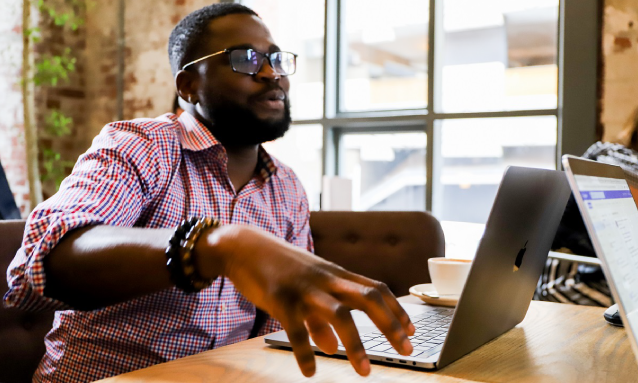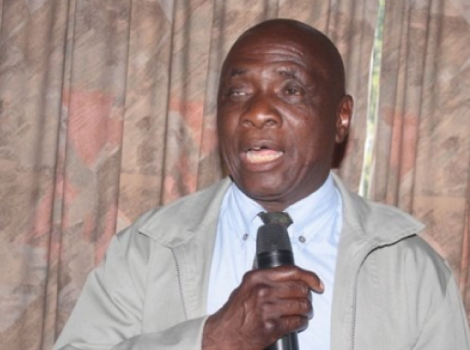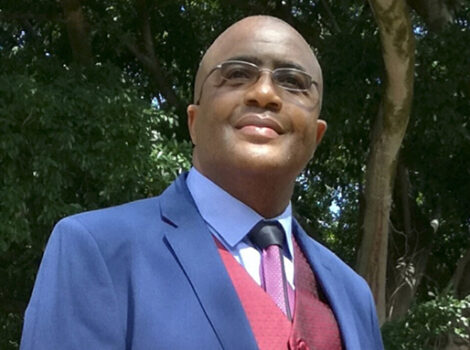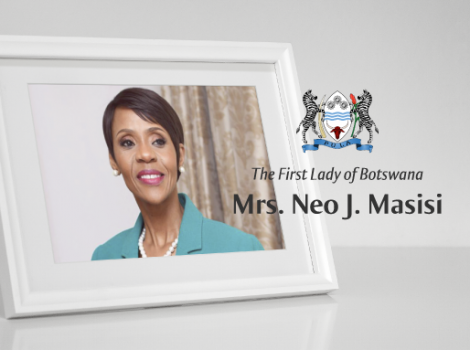
Landing Pads help small companies create world-class products quickly. In 2019, entrepreneurs Dr Omaru Maruatona and Solo Kombani used the Singapore Landing Pad to immerse the ground-breaking Aiculus cybersecurity tool in Singapore’s fast-paced fintech ecosystem. With a receptive commercial audience and smart connections in Southeast Asia’s tech sector, Aiculus is now gaining global traction and regional customers.
Australia has a thriving digital technology industry – spanning fintech, agtech and medtech – but local entrepreneurs face a big geographical challenge. If new ideas have to ‘succeed quickly or fail fast’, how do Australian innovators engage with an industry that is both global and ultra fast-moving? How do they build a globally competitive product before local customers are even ready?
One company facing this challenge is Melbourne-based Aiculus. Founded in 2017 by Dr Omaru Maruatona, the company tackles one of the biggest cybersecurity challenges of today: the weak spot created when programmers link one database or legacy system with another.
“Intra-systems connectivity is a huge growth area for organisations because it allows diverse systems to communicate,’ says Omaru.
‘The tool that enables us to do this integration is called an API [application programming interfaces]. These APIs are popular because they help legacy technology to live on and allow different systems to be interlinked.”
Despite their immense advantage, APIs are vulnerable to a host of attacks. According to Omaru, trying to secure them now takes up a lot of time for in-house IT staff. Omaru, who has a PhD in applied Artificial Intelligence (AI), conceived an API security tool built on detecting API traffic anomalies using AI. The idea was ground-breaking but to capitalise on it, Aiculus needed to move very fast indeed.
Immediately after founding Aiculus, Omaru took the idea to CyRise, a six-month cybersecurity accelerator program based in Melbourne. Just after CyRise, Omaru had a minimal viable product but commercial progress was slow. At the time, pitches resulted in limited interest and most Australian companies were just awakening to the security threat post by APIs.
‘We thought; “Hey, we’re ahead of our time here — but so what? To succeed, we need to find our market and make commercial progress now.”’
Immersive opportunities
In mid-2019, Omaru and Chief Operating Officer, Solo Kombani, met an Austrade adviser at a trade event. As the entrepreneurs talked, an idea took hold:
“Why not take the product into a pure cyber environment – somewhere that could stimulate development and trigger commercial opportunities?”
The advisor suggested the Landing Pad program as a way for Aiculus to immerse themselves in Singapore’s highly-developed cybersecurity market. The Landing Pads program is active in five regions around the globe. It is designed to help high-growth tech companies accelerate their growth and engage with global customers with extensive support from Austrade and its networks.
The suggestion was highly attractive. While many potential clients in Australia were just awakening to the issue of API security, the large cybersecurity industry in Singapore had already educated clients on the potential risks. Thus, the potential market in Singapore – including among major banks – appeared more receptive.
“The Landing Pad would enable us to validate our value proposition in a global market,” says Omaru.
“In effect, the market was a bit more ready to actively engage with our product. As it turned out, Singapore turned out to be the perfect launch market for a new
cybersecurity idea.”
Austrade had partnered with Australia’s peak cyber industry body, AustCyber, to design an industry-focused Landing Pad program in Singapore around the annual RSA Conference. AustCyber also provided financial support to participating Australian cybersecurity companies. The funds helped to offset some of the costs, including for travel and accommodation.
“We applied at the end of 2018, and were accepted in March 2019,’ says Kombani.
‘The program ran from May to August 2019. I moved to Singapore and attended the Landing Pad program for the entire three-month period at a shared office space near Raffles Place. There were three other Australian cyber scaleups in our cohort – and the experience was fantastic.”
A tech hub for Asia
During the Singapore residency, Kombani gained day-to-day assistance from three key figures.
A dedicated business development manager from Austrade provided introductions to Singapore-based businesses. An entrepreneur-in-residence hard-wired Aiculus into Singapore’s startup ecosystem. And the Landing Pads manager organised events, presentations and pitches – and was on-hand to help with practical requests.
“The Landing Pads program gives small tech companies one huge asset — credibility,” says Kombani.
‘The application process is rigorous, so by the time we pitched in Singapore, our core commercial proposition had been validated. Our target customers, partners or investors felt at ease when Austrade introduced us to them.
“Also, the various briefings gave us a really good view of Southeast Asia markets and how easy it would be to set up there. In a few hours, we gained commercial and cultural insights that would have taken weeks of desk research.”
Singapore swing
For Aiculus, Singapore proved the vibrant ecosystem it needed to validate product market fit and get a sense of the true need for the product outside of Australia.
“Being part of a cohort was a great advantage,” adds Kombani. “We were all entrepreneurs, trying to gain a breakthrough. Working with the other companies day-to-day meant there was real camaraderie as well as emotional support.
Also, Landing Pads alumni dropped in. These were entrepreneurs who had gone on to grow their business in Singapore. They had faced many similar challenges, so their insights were high-value.”
Singapore itself proved an ideal geographical launchpad for Asia.
“The city is small, but for us, it was the centre of a vast region. We could easily showcase to people from across Southeast Asia – so it meant less travel but more opportunity. We got great exposure and that really helped our business to keep powering ahead.”
Finding forward direction
Perhaps the biggest boost for Aiculus was discovering where its immediate future lay.
“We found out about yet another dedicated cyber-security accelerator – ICE71 – run by Cylon and backed by Singtel and the National University of Singapore (NUS),” says Omaru.
“That became our next stop and helped us establish a foothold in the country.”
Aiculus now has commercial clients in Asia-Pacific. This enables the company to keep refining its offerings, building product capability and gaining global competitive advantage.
“The Landing Pads program gave us a good insight into the South East Asia market and the greater Asian market,” says Omaru.
“In startups, timing is critical – you can be too early as well as too late. The Singapore Landing Pad gave us the exposure we needed when we needed it: Part of why we were successful in Singapore is because we went there when the timing was just right.”
For the complete article: http://www.austrade.gov.au/…/singapore-residency-stokes-cy…



